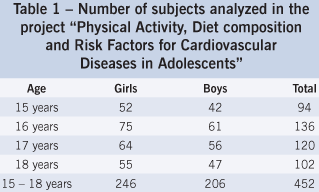OBJECTIVE: To provide descriptive information and investigate to what extent behavioral risk factors for cardiovascular diseases are associated with biological risk factors in the young population. METHODS: The sample included 452 adolescents (246 girls and 206 boys) between 15 and 18 years of age selected in a high school in the city of Londrina, Paraná. Risk factors of a behavioral nature were analyzed as regards insufficient physical activity, excessive intake of fat and cholesterol and smoking. As biological risk factor indicators we used overweight, high arterial pressure levels, and adverse concentration of serum lipids and lipoproteins. RESULTS: Approximately 20% of the girls and 16% of the boys presented at least one biological risk factor for development of cardiovascular diseases. Overweight was significantly associated with excessive intake of fats, while elevated arterial pressure was related to sedentary lifestyle and smoking. Excessive intake of fat and cholesterol indicated increased risk of undesirable concentrations of serum lipids and lipoproteins. The risk associated with altered blood pressure and serum lipids and lipoprotein was increased two-fold in smokers when compared with nonsmokers. CONCLUSION: The results reinforce the need for interventions targeted at the adoption of a healthy lifestyle, including the regular practice of physical exercise, appropriate dietary patterns, and abstention from smoking as of an early age.
Blood pressure; serum lipids-lipoproteins; overweight; physical activity; dietary patterns; smoking





